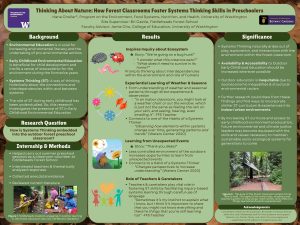Thinking About Nature: How Forest Classrooms Foster Systems Thinking Skills in Preschoolers
Environmental Education (EE) is an interdisciplinary field that increases our capability as a society to tackle the largest socio-ecological problems that we face today. Early childhood environmental education (ECEE), is especially important as it introduces children to environmental and social values during formative years of child development. Systems thinking (ST), a way of thinking holistically at interconnections within and between systems, is crucial in EE because environmental problems always affect and intersect complex socio-ecological systems. While the importance of ST in EE has been widely acknowledged, its role in ECEE has been understudied. This study attempts to answer the following questions: How is ST embedded into outdoor ECEE? What opportunities do outdoor preschool classrooms provide for fostering ST skills? Through a collection of anecdotes from my internship experience at Fiddleheads Forest School, paired with teacher interviews and literature review, I describe the ways in which ST naturally occurs within the forest classroom through play, exploration, and experience with nature. Outdoor learning environments provide opportunities for children to hone ST skills, including observing patterns and trends, recognizing interdependencies within systems, and changing perspectives. Importantly, teachers and caretakers play a vital role in encouraging ST by supporting children while ensuring that learning is inspired out of exploration and inquiry that sparks from wondering about the natural world. These findings illustrate the importance of increasing equitable accessibility to outdoor ECEE and the potential of incorporating ST into existing curricula. Through this, future environmental and climate justice leaders may become equipped with the skills and values necessary to maintain sustainable socio-ecological systems for generations to come.
